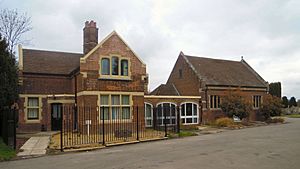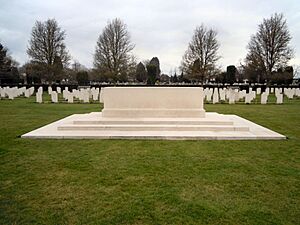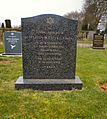Cambridge City Cemetery facts for kids
The Cambridge City Cemetery is a large burial ground located in Cambridge, Cambridgeshire. It's found north of the city, close to Cambridge Airport. Many people from Cambridge have been laid to rest here over the years.
The cemetery first opened on June 6, 1903. Back then, it was called Cambridge Borough Cemetery. Later, its name changed a few times before becoming The City Cemetery. It covers a large area, about eight hectares (which is like 20 football fields!).
Locally, people often call it the Newmarket Road Cemetery. You can visit it any day, including weekends and holidays. It has a car park and a special chapel for services. Besides the main burial areas, the cemetery also has specific sections for different faiths, like Jewish, Muslim, and Roman Catholic sections. There's also a large area for war graves and a peaceful Cantetebrigge Memorial Garden.
War Graves Section
The cemetery has a very important section dedicated to war graves, managed by the Commonwealth War Graves Commission. This is where 1,008 brave servicemen and women from both World War I and World War II are buried. It's one of only six cemeteries in the United Kingdom with so many war graves.
More than 180 of these graves are from World War I. During that time, a large military hospital was located in Cambridge. For World War II, there are 829 service burials, including three soldiers whose names are unknown.
Most of the World War II graves are in two special plots. The first plot was started in 1940. A larger plot for the Air Force was created in 1942. This was for those who died from Royal Air Force bases in eastern England, including places where Bomber Command and fighter planes were stationed. A special stone cross, called the Cross of Sacrifice, stands nearby.
A large stone, known as the Stone of Remembrance, was placed in the Air Force plot in July 1951. This type of stone is only found in cemeteries with over 1,000 Commonwealth war burials.
Famous People Buried Here
Many notable people are buried at Cambridge City Cemetery. Here are a few:
- Bertha Lewis: A famous opera singer.
- Alec David Young: A British expert in aero-engineering, which is about designing aircraft.
- Philip de Fonblanque: A senior British military officer who helped organize supplies and support for soldiers during World War II.
- Martin Roth: A well-known British psychiatrist.
- Chaudhry Rehmat Ali: An important figure who helped suggest the creation of the country of Pakistan. He is famous for proposing the name PAKSTAN.
- Alexis Charles Doxat: An English soldier who received the Victoria Cross, a very high award for bravery.
- James John McLeod Innes: A Scottish soldier who also received the Victoria Cross.
- Barbara Yung: A popular Hong Kong actress from the 1980s.
- Sir German Sims Woodhead: A pathologist, who studies diseases.
Gallery
-
The grave of aero-engineer Alec David Young
-
The grave of psychiatrist Sir Martin Roth
-
A section of the CWGC burials
 | Valerie Thomas |
 | Frederick McKinley Jones |
 | George Edward Alcorn Jr. |
 | Thomas Mensah |










